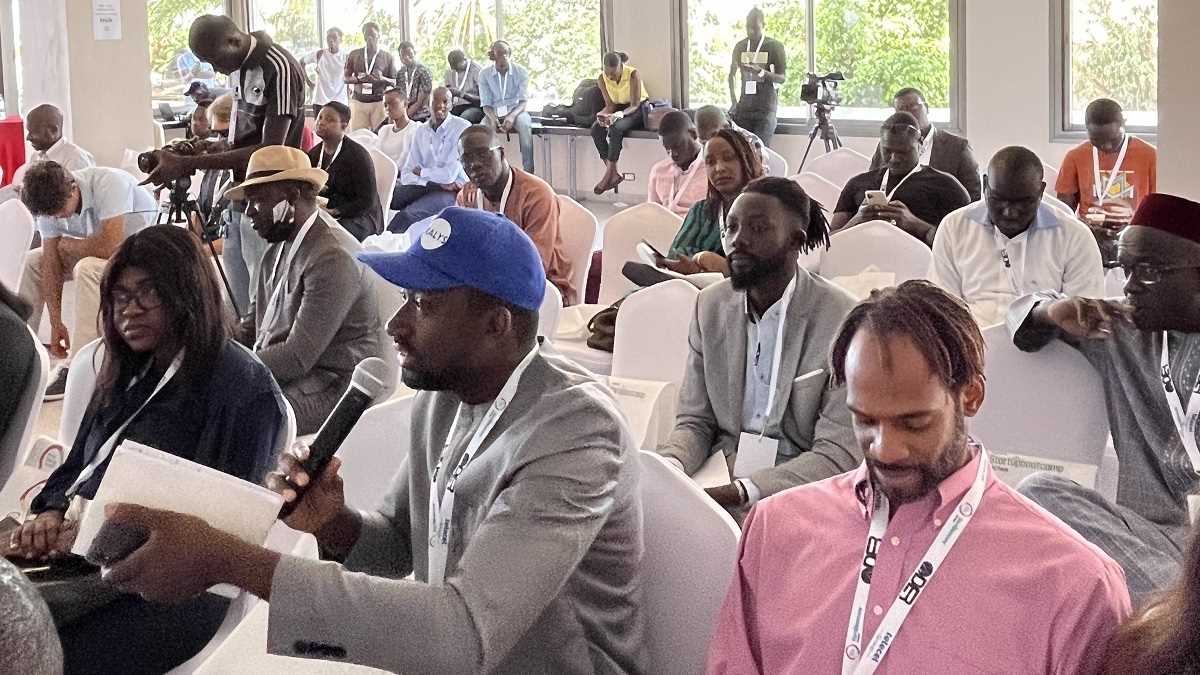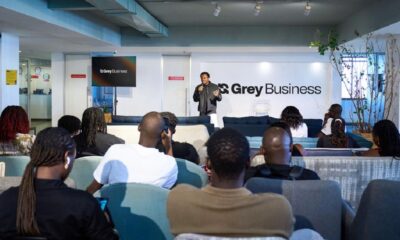The event took place on 6 July 2022 at Hotel Terrou Bi in Dakar, Senegal, and representatives from key partners, investment funds, government officials and ecosystem supporters were in attendance
CAPE TOWN, South Africa, July 6, 2022/APO Group/ —
In 2022, the global tech ecosystem has been plagued with uncertainties and what seems like a funding regression. The African ecosystem has grown against this tide and African startups raised more than double what they did last year. The success of earlier-stage businesses is unprecedented! According to Africa: The Big Deal’s (https://bit.ly/3IgZxUY) Max Cuvellier, startups in Africa are breaking new records every month so far in 2022!
This is one of the reasons why Demo Day for the Telecel Group (http://TelecelGroup.com) Africa Startup Initiative Program (ASIP) (http://ASIProgram.com), powered by leading tech accelerator, Startupbootcamp (SBC) AfriTech (https://bit.ly/2SxNwkd) was a resounding success. For the top eleven startups selected from a pool of over 2,500 applications, the day represented the culmination of three months of hard work, great effort, and the promise of a bigger future.
The event took place on 6 July 2022 at Hotel Terrou Bi in Dakar, Senegal, and representatives from key partners, investment funds, government officials and ecosystem supporters were in attendance. Speaking at the event, the Minister in charge of the General Delegation for the Rapid Entrepreneurship of Women and Youth (DER/FJ) (https://DER.sn/), Mama Aby Seye said,
“Senegal has the honor of hosting for 3 months 11 startups in acceleration on the Dhub innovation platform housed at DER/FJ. They are among the most promising of the continent. This is a strong signal for all African startups in search of an environment conducive to supporting their expansion. Telecel Group, Startupbootcamp, and DER/FJ are joining forces to create this environment through the ASIP program, to source and support the highest potential African startups to scale. I am delighted with the quality of the talented entrepreneurs accompanied on this cohort and I invite those interested in the program to apply for the 2 upcoming cohorts.”
DER/FJ’s (https://DER.sn) innovation space, which was commissioned by the President of Senegal, His Excellency Macky Sall, the DHub also acted as a campus for Cohort 2, and this led to collaboration and pilots facilitated by the government entity.
Speaking on a successful Cohort 2, The Startupbootcamp Program Manager Henry Ojuor had this to say; “This cohort was made up of a diverse group that was working in major developmental sectors that include Agriculture, Insurance, health, education, and sustainability. This demonstrates the dynamism of the African Tech Ecosystem as well as the increasing sophistication of solutions built by and for the African market. We’re immensely proud & honored to have been a part of the journey of our incredible startups and we also continue to stand proud in our methodology and process.”
Telecel Group also announced the launch of their pan-African customer-centric mobile application, “Telecel Play” at the event.
Speaking to this, Telecel Play Stephane Dine said, “Telecel Play is the only social marketplace where consumers also make money with their community. This super-app, which also includes a chat and a wallet, has been specially designed to allow you to sell and buy alone or in a group easily and quickly. This application will be launched in the B2B model by the end of the year, then will be open to consumers early next year in several African countries.”
Telecel Group reinforced its unwavering support for the development of startups in Africa and played a crucial role in assisting the top 11 in their proof of concepts and pilots.
ASIP Director Eleanor Azar had this to say:
Telecel Group reinforced its unwavering support for the development of startups in Africa and played a crucial role in assisting the top 11 in their proof of concepts and pilots
“Telecel Group Africa Startup Initiative Program is as proud of the graduates of Cohort 2 as the alumni of cohort 1, we seem to continuously find the best businesses who will help shape the future. Current developments in technology are changing the way we live, communicate, and do business, thus disrupting traditional industries and redefining work relationships; Startups coming out of the Telecel Group ASIP program powered by SBC AfriTech have been introduced to the forward-thinking methods which will equip them with the new skill sets required for the 21st Century”.
“Senegal has been a game-changer for eCampus (https://eCampus.camp),” says CEO Cecil Nutakor. With the assistance of Telecel Group, the AI-powered platform designed to monitor educational performance has managed to launch in Senegal and is thriving in Ghana.
Africa’s health care sector has been a cause for concern for decades and Neural Labs (https://bit.ly/3ynZDFO) spent the 12 weeks of the program in Dakar and Neural Labs managed to partner with the Ministry of Health to perform clinical trials in Senegal. The startup also received a $50,000 equity-free grant from UNICEF and was accepted into General Electric’s Eddison Program.
Agri-tech Agrodata received a donation for the fabrication and installation of 200 iSmarthives. “Telecel Group ASIP and Startupbootcamp AfriTech helped us to spread the word about our innovations and because of the publicity, we managed to get multiple partners to help us optimize farmlands with the iSmartHive to use honeybees as pollinators,” says CEO Olumide Ogubanjo.
Since joining the ASIP program, financial inclusion through investment startup Crowdyvest (www.Crowdyvest.com) managed to add an important feature to their value proposition. “With the help of ASIP, we will be able to add software as a service feature to our product offering, says CEO Tope Omotolani.” This means more people on the continent will have access to our products.
Ronald Mugaiga CEO at Ecomak Recyclers (www.EcomakRecyclers.com) cherishes the deep dives that the team took into his startup, and he believes fine-tuning his business model is the reason that they were selected to join the Africa Summit 2022.
For Senegalese transport startup Parcsmart (bit.ly/3In1I9p), the program illuminated the key factors in their unique selling proposition. The team won the GITEX North Star Dubai and was selected for the Google for Startups SDG program.
Rural Farmers Hub (https://RuralFarmersHub.com) managed to close a pre-seed round of $500,000. These funds will further advance the use of web and mobile-based technology to increase agricultural productivity in Nigeria, Burkina Faso, Zimbabwe, and other countries that Segun Adegun, Gabriel Eze, and team intend to penetrate in the next few years.
Insure-tech startup Vooli (https://bit.ly/3NGJPDG) managed to get pre-qualified for 5 country government contracts and they also onboarded 30 underwriting companies. The app uses valuation API technology to evaluate premiums for insurance companies and uses information processing to create the most cost-effective and efficient insurance coverage.
Nigerian startup Powerstove (https://Powerstove.com.ng) won the GSMA Innovation Fund and has made progress with a 500,000 Accredited certification program which will soon make them the biggest Carbon Credit Buying player & one of the biggest sustainability players in Africa. The startup’s patented innovative IoT-enabled smokeless stove that reduces energy costs and CHG emissions received a much-needed boost, helping them scale.
With the help of Telecel Group ASIP and Startupbootcamp, AfriTech, Edtech startup Qataloog (https://Qataloog.com) has begun an ambitious entry into Francophone Africa, especially Senegal where students are able to access digital libraries and avoid the continuously rising costs of physical textbooks. They’ve secured major partnerships with regional universities and have become a reason for excitement amongst local researchers, authors & publishers who see the value in helping their books get massive visibility & patronage via digital libraries across Africa on the Qataloog Platform. The market-maker for academic literature for students at colleges and universities has 38 universities and colleges as paying customers and they have also onboarded more than 2,800 academic publishers.
B2B eCommerce platform Proxalys (www.Proxalys.net) has scaled into Congo in addition to Senegal. The startup won the first prize at the Free au Senegal #FixChallenge pitch event.
In his closing remarks, SBC AfriTech CEO and Co-Founder, Philip Kiracofe said: “We are incredibly proud of this cohort and how their products and services will improve our lives. These founders are delivering solutions in their local communities and scaling across Africa.
Distributed by APO Group on behalf of Startupbootcamp AfriTech.


 Business4 days ago
Business4 days ago
 Events4 days ago
Events4 days ago
 Energy4 days ago
Energy4 days ago
 Energy3 days ago
Energy3 days ago
 Events4 days ago
Events4 days ago
 Business3 days ago
Business3 days ago
 Business3 days ago
Business3 days ago
 Business3 days ago
Business3 days ago











